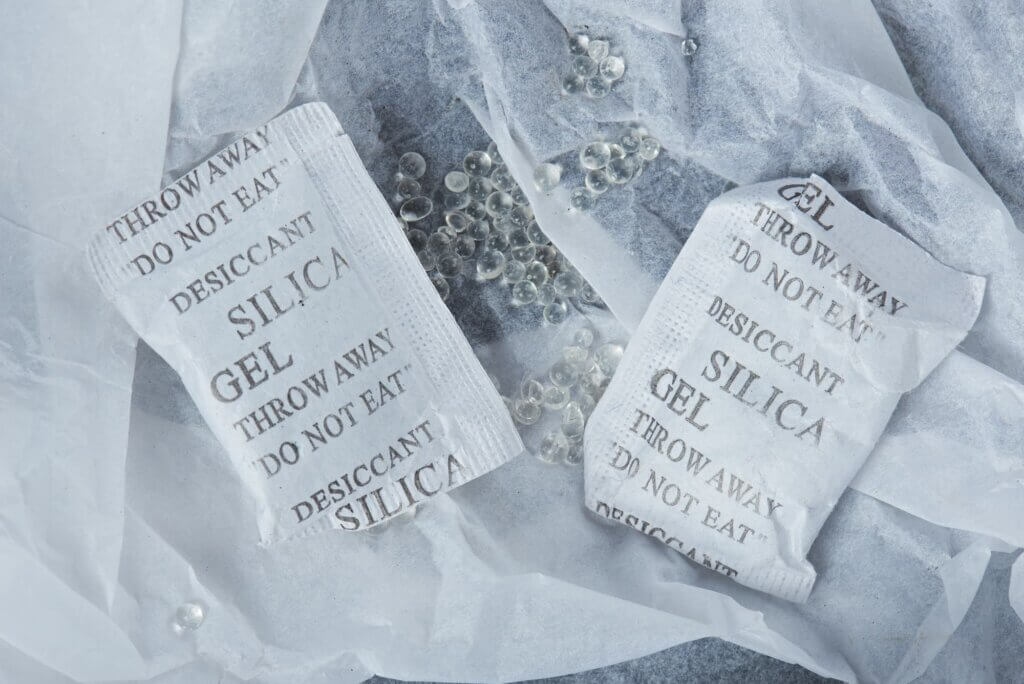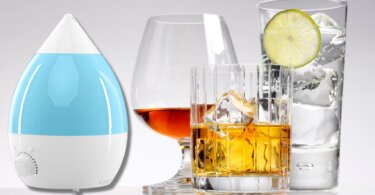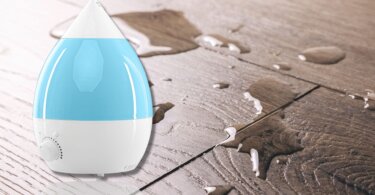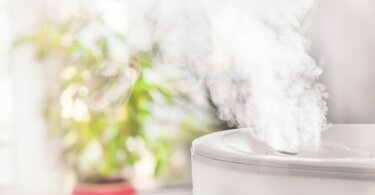Do you keep your humidifier beside your electronics, like your TV or computer? Well, you might want to reconsider that placement.
It is not recommended to place a humidifier near electronics because moisture can damage electronic devices.
The moisture emitted by the humidifier can be absorbed by electronic devices and lead to corrosion or short circuits. This is particularly concerning for those who live in dry climates and rely on their humidifier for comfort.
So, what can you do? In this article, I will cover everything you need to know about the damage humidifiers can cause to your electronics and how you can safely use a humidifier when you have electronic devices.
How Does Humidity Impact Electronic Equipment?
Humidity can have a significant impact on electronic equipment, potentially causing damage to circuit boards, corrosion, and other issues.
Both low and high humidity can be problematic: let’s see how.
Low Humidity
Low humidity can cause damage as it affects how electrical charges flow through electronic components.
When humidity levels are low, the air becomes dry and causes static electricity buildup. This can discharge unexpectedly and damage sensitive electronics.
The lack of moisture in the air also leads to the corrosion of metal parts within an electronic device due to oxidation.
This corrosion can lead to malfunctions within the device or complete failure of individual components, causing costly repairs or replacements.
Furthermore, low humidity levels create an environment where plastic materials become brittle and more prone to cracking or breaking over time.
Therefore, controlling humidity levels is critical for maintaining the functionality and longevity of electronic equipment.
High Humidity
High humidity can also have a severe impact on electronic equipment, especially those used in various industrial applications.
The presence of moisture and high humidity levels can cause corrosion, rusting, short circuits, and other related problems leading to damage or partial failure of the equipment.
Moisture in the air can also accumulate within the device’s electronics.
This can lead to electrical leakage, reduced conductivity, or insulation breakdowns resulting in slow performance, malfunctioning, or complete failure.
Humid conditions increase static electricity build-up on electronic pathways. This may generate sparks and cause electromagnetic interference disruptions of nearby devices.
It could cause data loss or compromise the integrity of records as well as risk worker safety due to failures and malfunctions.
Right Humidity Level for Electronic Equipment
A humidity level between 40-60% is generally considered ideal for most types of electronics. This level helps prevent damage from static electricity and corrosion caused by excessive moisture.
However, certain specialized equipment may require a tighter range, such as printing presses which should be kept at around 55% humidity.
On the other hand, extremely low humidity levels can cause problems by drying out delicate components, leading to the cracking or breaking of parts.
It’s also necessary to consider potential fluctuations in humidity levels over time.
Regular monitoring and regulation of humidity levels are imperative for maintaining electronic equipment and ensuring maximum efficiency and longevity.
Devices Sensitive to Humidity
Devices are sensitive to humidity because water is a potent conductor of electricity.
Electrical circuits in devices rely on an uninterrupted flow of electrical signals through their internal components. This can be impeded by the presence of moisture in the form of humidity.
Would It Be Safe for My Computer if I Ran a Humidifier in the Same Room?
It is generally safe to run a humidifier in the same room as a computer as long as proper precautions are taken.
The primary concern is excess moisture can damage computer components, leading to malfunctions or even complete failure.
However, modern computers are designed with humidity-resistant materials and protective coatings. This should prevent any damage from occurring under normal circumstances.
Nevertheless, it’s still recommended to keep the humidifier at least a foot away from the computer to minimize risks. Also, make sure you avoid aiming the mist directly at your computer.
Would It Be Safe to Put a Humidifier Near TV?
The moisture emitted by the humidifier can settle on the television screen and cause damage if left unchecked for an extended period of time.
It is important to ensure the humidifier is placed in a way that does not obstruct any ventilation ports or block the flow of air around it.
Consistent exposure to excess moisture could lead to electrical issues or other problems with the device.
Therefore, it is recommended that individuals place their humidifiers at least several feet away from electronic devices to minimize any potential risk of damage.
Additionally, regularly cleaning and maintaining the humidifier and television can help prevent issues caused by excess moisture.
Can Humidifier Mist Destroy a Cellphone?
There is no evidence to suggest that humidifier mist can destroy a cell phone.
Excessive moisture can cause damage to electronic devices. Some may include corroding the internal components and causing malfunctions or a complete failure; the level of humidity produced by a standard household humidifier is unlikely to cause harm.
However, caution should be exercised when using electronic devices near any source of water or moisture.
It is recommended to keep electronics at safe distances from humidifiers and other sources of moisture to prevent potential damage.
Overall, there is no reason to believe humidifier mist poses an immediate threat to your cellphone when used appropriately.
Can a Humidifier Damage Your Computer?
According to experts in the field of computer maintenance and repair, using a humidifier near your computer can potentially cause damage.
High humidity levels can lead to condensation forming on the internal components of your computer, causing corrosion or short circuits.
Computer manufacturers often advise keeping their products in dry environments with relative humidity levels between 35% and 50%.
If you must use a humidifier in the same room as your computer, it is recommended to keep them at opposite ends.
Additionally, it is essential to maintain your computer’s hardware to prevent any potential harm caused by moisture build-up.
Related article: What Should I Set My Humidifier To?
Using Humidifiers Without Damaging Electronics
High levels of humidity can cause condensation on electronic devices, leading to corrosion and irreparable damage.
It is essential to keep the humidifier away from electronics and ensure there is adequate ventilation in the room.
The ideal relative humidity level for a safe environment for electronics ranges between 30-60%.
Regular maintenance of humidifiers, such as cleaning them, refilling them with filtered water, and changing filters, can reduce the chances of water particles interacting with electronic components.
It’s also best to place the humidifier at least three feet away from any electronic device to prevent splashing water or dripping into delicate parts, which could lead to short circuits.
Properly managing humidity levels around electronics ensures both longevity of electronic devices and personal safety.
Other Ways To Protect Electronics From Humidity
To ensure the optimum functionality and lifespan of electronic devices, it is critical to protect them from humidity.
One effective method is through the use of silica gel packets, which absorb moisture in the surrounding environment.
However, simply placing these packets near the electronics may not be enough in areas with high humidity levels.
In such cases, installing a suction fan system that circulates air within an enclosed space can drastically reduce the humidity levels.

Silica Gel
Silica gel is a highly effective method for protecting electronics from humidity.
This versatile desiccant, composed of porous silicon dioxide beads, has the unique ability to absorb excess moisture and prevent its accumulation within electronic devices.
It has been found that even when exposed to high levels of humidity, silica gel can maintain a dry environment around delicate components for a long time.
Given its effectiveness in reducing damaging effects and maintaining device longevity, the use of silica gel is recommended for any environment.
Suction Fan
Suction fans are crucial components in many electronic devices that require protection from humidity. They help regulate and control the moisture level in the air around sensitive electronics.
These fans work by creating negative pressure within a device. This allows it to effectively draw out any moisture or other unwanted particles from the surrounding environment.
It is especially important in environments where high levels of humidity are present, as excessive moisture can cause significant damage.
By utilizing suction fans, professionals can ensure their equipment remains functional and efficient for a longer time.
Tip! Check out my personal selection of Best Humidifiers for Hard Water
Wrap Up
In conclusion, it is possible to use a humidifier near electronics without causing damage, but certain precautions must be taken.
Firstly, ensure the humidifier is placed at least one meter away from electrical devices and avoid aiming the mist directly at the devices.
Secondly, limit the duration of usage to avoid over-humidifying the air, which may cause moisture buildup on electronic components.
Thirdly, choose a high-quality humidifier with advanced features like automatic shut-off and adjustable humidity levels.
Lastly, regularly clean and maintain the device according to the manufacturer’s instructions.
By following these guidelines carefully, you can enjoy healthy humidity levels without compromising your electronic devices’ safety or performance.





Leave a Comment